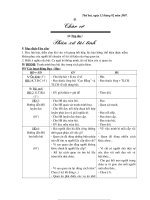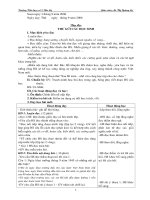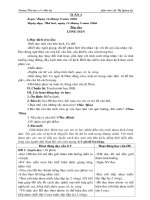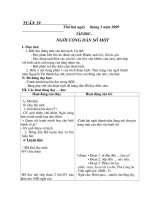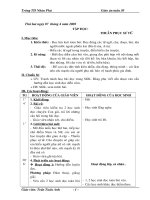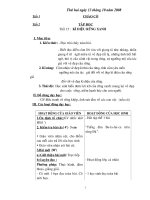Giáo án lớp 5 tuần 2
Bạn đang xem bản rút gọn của tài liệu. Xem và tải ngay bản đầy đủ của tài liệu tại đây (1.2 MB, 10 trang )
<span class='text_page_counter'>(1)</span><div class='page_container' data-page=1>
<b>Date of preparing:13/9/2019 Week: 2</b>
<b> Period: 5</b>
<b> UNIT 1</b>
<b>WHAT’S YOUR ADDRESS?</b>
<b>Lesson 3 ( Part:1,2,3) </b>
<b>I. Aims</b>
<b> 1. Knowledge: </b>
<b> By the end of this unit, pupils can</b>
<i>• use the words and phrases related to the topics Addresses and hometown.</i>
<i>• pronounce two-syllable words with the stress on the first syllable: 'city, 'village, </i>
<i>'mountains and 'tower.</i>
<b> 2. Skills: Develop listening skills and pronuciation.</b>
<b> 3. Attitude: Students feel confident to listening and pronunce two-syllable words </b>
with the stress on the first syllable well.
<b>II. Teaching aids</b>
<b> 1. Teacher’s: student's and teacher's book, pictures, computer, and projector.</b>
<b> 2. Students': Books, notebooks, workbooks</b>
<b>III. Method</b>
P.P.P, MAT, TPA.
<b>IV. Procedure</b>
<b>1. Organization (1min)</b>
- Greeting
- Checking for the students’ attendance.
Date of teaching Class Student’s absent
16/9/2019 5E1
16/9/2019 5E2
16/9/2019 5E3
<b>2. Warm up (4 mins)</b>
- Spend a few minutes revising the previous lesson by inviting a few pupils to
<i>read their answers to Activity 5. Give feedback and introduce Lesson 3.( Using </i>
activinspire)
<b>3. New lesson</b>
<b>Teacher’s and Students’ activities</b> <b>Contents</b>
<b>* Activity 1( 10 mins).</b>
• Tell the class that they are going to
practise saying two-syllable words with
<b>1. Listen and repeat. </b>
</div>
<span class='text_page_counter'>(2)</span><div class='page_container' data-page=2>
the stress on the first syllable. Explain
that in a word with more than one
syllable, one of the syllables is usually
said with more emphasis than the rest
<i>(e.g. 'city, 'village, 'mountains and </i>
<i>'tower).</i>
• Play the recording all the way through
for pupils to listen and follow in their
books. Then play it again for them to
repeat all the words and sentences twice.(
Using activinspire)
<b>*Activity 2( 10 mins).</b>
• Tell the class that they are going to
<i>listen and circle a or b to complete the </i>
sentences.
• Give them a few seconds to read the
sentences in silence before playing the
recording for them to do the task.
• Get them to compare their answers in
<i>pairs before checking as a class. ( Using </i>
Mysware)
<b>* Activity 3( 10 mins).</b>
• Tell the class that they are going to say
<i>the chant Where do you live? Have them </i>
read the chant and check their
comprehension.
• Play the recording all the way through
for pupils to listen and follow in their
books. Then play it again for them to
repeat line by line.
• Put the class into two groups to practise
chanting: one chants the questions and the
other chants the answers.
• Have them practise chanting and doing
actions in groups.
• Invite two or three groups to say the
<i>chant and do actions. ( Using activinspire)</i>
'village My best friend lives
in a 'village.
'mountains I live in the
'mountains.
'tower He lives in a tall and
quiet 'tower.
<b>2. Listen and circle a or b. Then </b>
<b>say the sentences aloud. </b>
1.Linda lives in a big ______
<b>a.country b.city</b>
2.They live in the _______
<b>a.countryside b.mountains</b>
3.We live in Binh Minh ______
<b>a.Tower b.Town</b>
<b>Key: 1 b 2 a 3 a</b>
<b>3. Let’s chant </b>
</div>
<span class='text_page_counter'>(3)</span><div class='page_container' data-page=3>
- Learn about listening and pronunce two-syllable words with the stress on the
first syllable.
<b>5. Homework (1min): </b>
- Learn the chant by heart.
<b>V. Evaluation.</b>
………...
………...
………...
<b>Date of preparing:13/9/2019 Week: 2</b>
<b> Period: 6</b>
<b> UNIT 1</b>
<b>WHAT’S YOUR ADDRESS?</b>
<b>Lesson 3 ( Part:4,5,6,7) </b>
<b>I. Aims</b>
<b> 1. Knowledge: </b>
<b> By the end of this unit, pupils can</b>
<i>• use the words and phrases related to the topics Addresses and hometown.</i>
<i>• ask and answer questions about one’s address, using What’s your address? It’s ...</i>
<i>• ask and answer questions about what a village/town/city is like, using What’s </i>
<i>the ... like? It’s ...</i>
<b> 2. Skills: Develop reading and writing skills.</b>
<b> 3. Attitude: Introduce one’s address and place well.</b>
<b>II. Teaching aids</b>
<b> 1. Teacher’s: student's and teacher's book, pictures, computer, and projector.</b>
<b> 2. Students': Books, notebooks, workbooks</b>
<b>III. Method</b>
P.P.P, MAT, TPA.
<b>IV. Procedure</b>
<b>1. Organization (1min)</b>
- Greeting
- Checking for the students’ attendance.
Date of teaching Class Student’s absent
17/9/2019 5E2
17/9/2019 5E1
17/9/2019 5E3
</div>
<span class='text_page_counter'>(4)</span><div class='page_container' data-page=4>
<i> Spend a few minutes having the class say the chant Where do you live?( Using </i>
<i>activinspire)</i>
<b>3. New lesson</b>
<b>Teacher’s and Students’ activities</b> <b>Contents</b>
<b>* Activity 1( 10 mins).</b>
• Tell the class that they are going to read
the text and tick Yes or No.
• Get them to read the sentences and
underline the key words/phrases before
reading the passage to fnd the relevant
information. Give them an example: In
Sentence 1, Trung lives with his parents
in Ha Noi. But in the passage, the
information is: Trung lives with his
grandparents in ha Noi. So pupils should
tick the box No.
• Set a time limit for pupils to do the task
independently. Monitor the activity and
o er help, if necessary.ff
• Have them compare their answers
<i>before checking as a class.( Using </i>
<i>activinspire and mysware)</i>
<b>*Activity 2( 10 mins).</b>
• Tell the class that they are going to
write about one of their friends.
• Give them time to read the questions
and write the frst draft of their answers in
their
notebooks.
• Set a time limit for them to do the task
independently. Monitor the activity and
o er help, if necessary.ff
• Remind them to write the frst letter of
each sentence and the name of their friend
<b>4. Read and tick Yes (Y) or No </b>
<b>(N). </b>
Trung lives with his grandparents in
Ha Noi. His address is 81, Tran
Hung Dao Street, Hoan Kiem
District, Ha Noi. The family lives on
the fourth floor of Ha Noi Tower.
Their flat is big and modern. It has a
fine view. Trung likes the new place
because it is in the city centre and
near his new school.
1.Trung lives with his parents in Ha Noi.
2.He lives in a tower.
3.His flat is far from the city centre.
4.His new school is near his home.
5.Trung likes his new home.
<b>Key: 1 N 2 Y 3 N 4 Y 5 Y</b>
<i><b>5. Write about your friend. </b></i>
1. What’s his/her name?
2. Where is he/she from?
3. What’s his/her address?
4. Who does he/she live with?
5. What’s his/her home like?
6. Does he/she like his/her
hometown? Why?/Why not?
</div>
<span class='text_page_counter'>(5)</span><div class='page_container' data-page=5>
in capital letters, and put commas and full
stops at the appropriate places.
• Get them to swap and read their writing
in pairs before inviting two or three pupils
<i>to read their answers aloud. ?( Using </i>
<i>activinspire)</i>
<b>* Activity 3(5 mins).</b>
• Tell the class that they are going to do a
drawing project. They should work in
groups to discuss the house they are going
to draw, and its address. Then ask them to
draw it on a piece of paper.
• Set a time limit for them to do the task.
• Invite a few groups to present their
drawings to the class and talk about them.
• If there is not enough time, give the
activity as homework and talk about the
drawings in the next lesson as a warm-up
activity.
• Display their drawings in the classroom
<i>if you wish. ( Using activinspire)</i>
<b>* Activity 4(5mins).</b>
• Have the class read the statements and
check their comprehension.
• Give them time to colour the stars and
invite a few pupils to read the statements
aloud.
• Give further support to pupils who fnd it
difcult to achieve certain objectives.
<b>6. Project </b>
<b> </b>
<b> Draw a house and write its </b>
<b>address.</b>
<b>7. Colour the stars. </b>
<b>4. Consolidation ( 2 mins)</b>
- Learn about asking and answering questions about one’s address, asking and
<i>answering questions about what a village/town/city is like, using What’s the ... </i>
<i>like? It’s ...</i>
<b>5. Homework (1min): </b>
- Practise introducing one’s address and place well.
<b>V. Evaluation.</b>
</div>
<span class='text_page_counter'>(6)</span><div class='page_container' data-page=6>
<b>Date of preparing:13/9/2019 Week: 2</b>
<b> Period: 7</b>
<b> UNIT 2</b>
<b>I always get up early.</b>
<b>How about you? </b>
<b>Lesson 1 ( Part:1,2,3 ) </b>
<b>I. Aims</b>
<b> 1. Knowledge: </b>
<b> By the end of this unit, pupils can</b>
<i>• use the words and phrases related to the topic Daily routines.</i>
<i>• ask and answer questions about someone’s daily routine, using What do you </i>
<i>do ...?I always/usually/often/sometimes ...</i>
<b> 2. Skills: Develop listening and speaking skills</b>
<b> 3. Attitude: Students feel confident to introduce their daily routine.</b>
<b>II. Teaching aids</b>
<b> 1. Teacher’s: student's and teacher's book, pictures, computer, and projector.</b>
<b> 2. Students': Books, notebooks, workbooks</b>
<b>III. Method</b>
P.P.P, MAT, TPA.
<b>IV. Procedure</b>
<b> 1. Organization (1min)</b>
- Greeting
- Checking for the students’ attendance.
Date of teaching Class Student’s absent
17/9/2019 5E3
18/9/2019 5E2
19/9/2019 5E1
<b>2. Warm up (4 mins)</b>
- Have the class talk about their houses, using the drawings from Unit 1, Lesson 3,
Activity 6.
Get them to point at each drawing and say the address and what it is like. Introduce
the new lesson by writing the title on the board and have pupils repeat it once or
twice.( Using activinspire)
<b>3. New lesson</b>
</div>
<span class='text_page_counter'>(7)</span><div class='page_container' data-page=7>
<b>* Activity 1(10 mins) </b>
• Have the class look at the pictures. Introduce the
story by pointing at each character and elicit their
<i>answers to the questions: Who’s this? What’s he </i>
<i>doing? Who’s he talking with online? What does he </i>
<i>do in the morning? What does he do after school/in </i>
<i>the afternoon?</i>
• Play the recording all the way through for pupils to
listen and follow in their books. Play it again for them
to repeat line by line.
• Check their understanding of the story. ( Using
activinspire)
<b>*Activity 2(10 mins) </b>
• Tell the class that they are going to practise asking
and answering questions about someone’s daily
<i>routines, using What do you do in the </i>
<i>morning/afternoon/evening? Ialways/usually/often/ </i>
<i>sometimes ...</i>
• Have pupils look at the pictures. Teach them how to
read the words and phrases under each picture.
• Ask them to pay attention to the pronunciation of
<i>the words: 'always, 'usually, 'often and 'sometimes.</i>
<i>• Point at each picture and ask the question What do </i>
<i>you do ...? for pupils to answer chorally, using the </i>
information under the picture.
• Have them practise asking and answering the
questions in pairs. Then invite one or two pairs to
speak to check their performance. ( Using activinspire
and violet)
<b>* Activity 3(10 mins)</b>
• Tell the class that they are going to practise further
by asking and answering questions about someone’s
daily routines. Get pupils to work in pairs. Remind
them to use the questions and answers in their books.
• Set a time limit for them to practise. Monitor the
activity and offer help, if necessary.
• Invite a few pairs to act out their conversations.
Then give feedback. ( Using activinspire)
<b>1. Look, listen and repeat </b>
- Dialogue on page 12 ( student’s
book )
<b>2. Point and say. </b>
<i>* What do you do in the </i>
<i>morning/afternoon/evening?</i>
<i> - I always/usually/often/ </i>
<i>sometimes ...</i>
a. morning/always brush my
teeth
b. morning/usually do
morning exercise
</div>
<span class='text_page_counter'>(8)</span><div class='page_container' data-page=8>
<b>3. Let’s talk </b>
<b> Ask and answer questions about </b>
<b>your daily routines.</b>
What do you do in the
morning/afternoon/evening?
<b>4. Consolidation ( 2 mins)</b>
- Learn about asking and answering questions about someone’s daily routine .
<b>5. Homework (1min): </b>
- Practise asking and answering questions about someone’s daily routine.
<b>V. Evaluation.</b>
………...
………...
………...
<b>Date of preparing:13/9/2019 Week: 2</b>
<b> Period: 8</b>
<b> UNIT 2</b>
<b>I always get up early.</b>
<b>How about you? </b>
<b>Lesson 1 ( Part:4,5,6 ) </b>
<b>I. Aims</b>
<b> 1. Knowledge: </b>
<b> By the end of this unit, pupils can</b>
<i>• use the words and phrases related to the topic Daily routines.</i>
<i>• ask and answer questions about someone’s daily routine, using What do you </i>
<i>do ...?I always/usually/often/sometimes ...</i>
<b> 2. Skills: Develop listening and reading skills</b>
</div>
<span class='text_page_counter'>(9)</span><div class='page_container' data-page=9>
<b>II. Teaching aids</b>
<b> 1. Teacher’s: student's and teacher's book, pictures, computer, and projector.</b>
<b> 2. Students': Books, notebooks, workbooks</b>
<b>III. Method</b>
P.P.P, MAT, TPA.
<b>IV. Procedure</b>
<b> 1. Organization (1min)</b>
- Greeting
- Checking for the students’ attendance.
Date of teaching Class Student’s absent
18/9/2019 5E3
19/9/2019 5E2
20/9/2019 5E1
<b>2. Warm up (4 mins)</b>
- Spend a few minutes revising the previous lesson by inviting one or two pairs of
<i>pupils to ask and answer questions about their daily routines, using What do you </i>
<i>do in the morning/afternoon/ evening? I always/usually/often/sometimes ... </i>
( Using activinspire)
<b>3. New lesson</b>
<b>Teacher’s and Students’ activities</b> <b>Contents</b>
<b>* Activity 1(10 mins) </b>
• Tell the class that they are going to listen
to the recording and tick the correct
pictures.
• Ask them to look at the pictures to
identify the characters and their activities.
• Play the recording all the way through
for pupils to listen and tick the pictures.
Play it again for them to check their
answers. Monitor the activity and o er ff
help, if necessary.
• Get pupils to compare their answers
before checking as a class. Play the
recording a third time to confrm the
answers. ( Using activinspire and
mysware)
<b>*Activity 2(10 mins) </b>
• Tell the class that they are going to read
<i>and fll the gaps with like, do, TV, play and </i>
<b>4. Listen and tick. </b>
<b>Key: 1 </b>c <b>2 </b>b <b>3 </b>b <b>4 </b>a
<i><b>2. Read and complete. </b></i>
</div>
<span class='text_page_counter'>(10)</span><div class='page_container' data-page=10>
<i>usually.</i>
• Give them a few seconds to read the text
and the words in the box. Remind them to
focus on the context to select the
appropriate words.
• Set a time limit for pupils to do the task
independently. Monitor the activity and
o er help, if necessary.ff
• Get pupils to compare their answers in
pairs before checking as a class. If there is
enough time, have the class read the
completed text aloud. . ( Using activinspire
and mysware)
<b>* Activity 3(10 mins)</b>
• Tell the class that they are going to sing
<i>the song This is the way we do things. </i>
Have pupils read each line of the lyrics
and teach the unfamiliar words. Check
comprehension.
• Play the recording all the way through
for pupils to listen and follow in their
books. Play it again and ask pupils to do
choral repetition line by line.
• When pupils are familiar with the
melody, ask the class to sing along with
the music before having them practise
singing and doing actions in groups.
• Invite a group to sing the song and do
actions in front of the class. . ( Using
activinspire)
and then go to school. After school,
I (2) … do homework with my
classmates. Then I often go to the
sports centre and (3)…. football. In
the evening, I sometimes
watch (4) … I (5)… watching films
after dinner.
<b>Key: 1 do 2 usually 3 play 4 TV 5</b>
like
<b>3. Let’s sing </b>
<b> </b>
<b>4. Consolidation ( 2 mins)</b>
- Learn about listening and reading someone’s address.
<b>5. Homework (1min): </b>
- Practise asking and answering questions about someone’s address.
<b>V. Evaluation.</b>
</div>
<!--links-->



